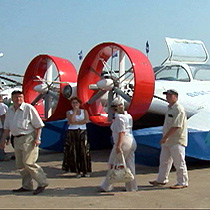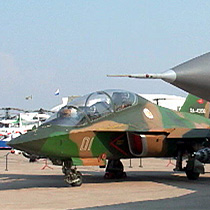2007年VOA标准英语-Moscow Air Show Demonstrates Russian Commercial(在线收听)
By Peter Fedynsky
Moscow
24 August 2007
President Vladimir Putin on Tuesday opened the Moscow International Aviation and Space Show, the eighth such event in the Russian capital since 1993. At the opening ceremony, Mr. Putin emphasized the need to develop his country's high technology for commercial as well as military applications. VOA Correspondent Peter Fedynsky has this report from the once-secret Zhukovsky air base near Moscow.
 |
| Visitors to the air show at the once-secret airbase got close-up looks at civilian and military aircraft |
The air show's festive atmosphere and demonstration flights by old-time biplanes underscore the sheer pleasure of flying.
Russian military aviation is also on display, though much of the country's air force, including the TU-160 strategic bomber, has been grounded since the Soviet collapse in 1991.
On August 17th, Russian President Vladimir Putin announced the resumption of his country's strategic aviation. "I have made a decision to renew the flights of strategic aviation on a permanent basis and today, at midnight, 14 strategic bombers of Russia, together with support planes and refueling tankers, took off from seven airfields in various parts of Russia. It was the beginning of combat air patrol with 20 aircraft taking part," said the president.
 |
| Numerous military aircraft were on display |
Many Russians welcome such moves. Alexander Zasorin, a helicopter maintenance engineer, offers this assessment of his country's military potential since the period of late-Soviet reforms known as perestroika. "After perestroika, when the Russian economy stagnated, I would have said at the time our potential was weak. But now it's being reborn."
American and other foreign observers at the Moscow Air Show give Russian military technology high marks. They add, however, it is too early to assess the country's overall high tech potential. Colonel Manuel Murato is the Spanish military attaché in Moscow. "Russia has been making a big effort during the last years, and according to my colleagues, it seems that this is something that will be improving in the following years,” he says. “It's too early to assess this potential, but I'm sure that in a few – maybe not in a few years, maybe a few months – we can say some words about it."
The first commercial deals reported at the Moscow Air Show involve the sale of Russian passenger planes to Cuba and Iran. The two contracts are worth more than $350 million.